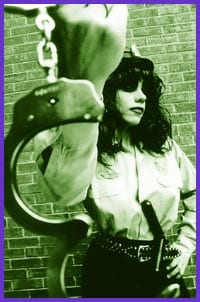Chances are, you’re a criminal.
The young man you went down on at Cherry Beach – that’s enough to get you branded. And your night at the Pussy Palace was not cool either.
Much of what surrounds gay culture has always been illegal in little ways – so much so that most have said “Why bother?”
As for the cops’ attitude toward the community – it wasn’t so long ago that cops mentioned queers in the same breath as public enemies.
Then along came community policing, a warm and fuzzy ideal that promised to bridge the gap.
Community Policing is not about beefing up the force and buying helicopters. If anything, it means fewer coppers and more self-policing – kind of like doctors, lawyers, and other rich folks get to do.
More specifically, it was about stopping so-called lawlessness without turning people who were running with metaphorical scissors into criminals.
For example, when police cracked down on back room sex in 1996, they didn’t exactly bust into Boots, the Black Eagle, or the Barn. Instead, they warned men that they’d be charged if the boozy bliss continued. Nobody was being branded a sex-criminal, and folks were told to be happy with that.
“Isn’t that nice of my officers,” then 52 Division Superintendent Jim Parkin said at the time, “to be warning people rather than laying charges.”
But the lip service to kinder and gentler law enforcement is coming undone like a 6am drag queen.
The very definition of community policing has become so qualified, so watered down and re-worked, that the phrase doesn’t stand for more than cops in cars at this point.
This summer’s raids on the Bijou porn theatre, for example, continued until 19 men were arrested and the club shut down.
As for this war with the squeegee kids, that’s getting just a little too stupid for words. I was dumb enough to think that neighbourhood watch was about making sure my neighbours weren’t get attacked. But the folks around here are too busy jotting down the licence plates of amorous men and taking Polaroids of prostitutes.
Despite falling crime rates, apparently there’s still enough violence around to keep Toronto’s finest working over time to claim the $1.9-million set aside for the Community Action Policing initiative (CAP).
Championed by Downtown Councillor Kyle Rae, CAP kicked off July 15, putting extra coppers in so-called high crime areas for 11 weeks.
For all the talk, the program’s aim has ultimately been shaped to push the things that make Torontonians squeamish underground.
Inspector Randal Munroe is responsible for putting CAP into action. He’s criticized Mayor Mel Lastman’s feverish anti-squeegee rhetoric, but his message is similar.
“You can look any way you want,” Inspector he Munroe told the Globe And Mail. “What is problematic is when your activity is causing stress within the community.”
Myself, I’m rooting for the squeegees.
Between fumbling politicians, keen cops, and nosy neighbours, community policing has some of the strangest people complaining. Many upstanding people refuse to grapple with the fact that they’ve fractured a few laws themselves.
As for me, so long as you don’t bat people around, pee in the pool, or build explosive devices, you probably don’t owe the flat feet more than a nod.
Most of all, CAP has everything to do with prostitution, pimps, and the war on drugs. Not that there’s a well-meaning plan. Just more police hassling more people – at greater expense. The program was barely under way when the force showed up at council with a $10 million overrun, none of which stopped the droning plea for a chopper.
Even more bizarre, on the eve of the plan’s implementation Mayor Mel Lastman announced that one of CAP’s aims is to rid parks of condoms and needles, charging violators if necessary.
Fine. Leaving soiled rubbers around could be construed as rude. But it’s all a bit much to take when you consider that Lastman threatened to kill a man earlier this year.
There have been other provocative public remarks. A straight-faced Rae says some “behaviour” in the Church-Wellesley area is “out of control.” Det Sgt Doug Singleton talks about going by the book each time officers see an indecent act in a bathhouse.
Is it better to police ourselves then, than wait for the cops to do it for us? Certainly the Pride committee is torn on the issue. For the parade two years ago, volunteers were told to police the parade for nudity.
“If somebody comes up and says, ‘I saw a nude person over there,’ [volunteers] are to proceed to the nearest policeman and inform that policeman that a nude person was seen,” David Clark, Pride co-chair that year, told volunteers.
But that kind of self-policing didn’t prevent arrests, it produced them. Sure enough, a naked woman was cuffed and arrested by police.
For the moment, it could be that police aren’t really worried about your minor dalliances. It could be that they’re looking for direction from the community, trying to get all warm and fuzzy on us.
But things change fast.

 Why you can trust Xtra
Why you can trust Xtra


